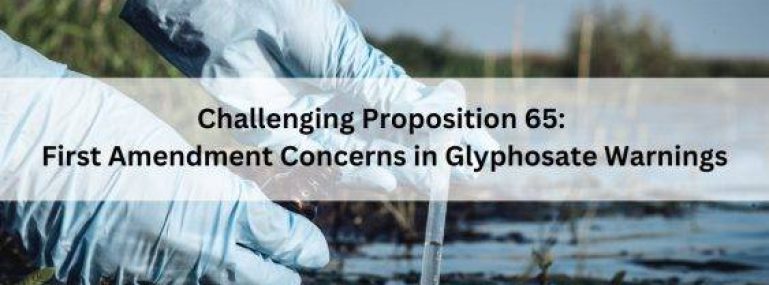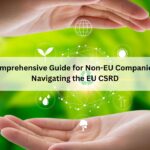Proposition 65, designed to alert the public about potential exposure to harmful chemicals such as Glyphosate, a key component in many herbicides, has sparked a legal and philosophical debate. The controversy stems from the requirement for businesses to issue warnings about these chemicals. Critics argue that such warnings impinge on the First Amendment rights of businesses by compelling them to engage in speech mandated by the government. On February 26, 2018, the District Court issued a preliminary injunction preventing the California Attorney General from enforcing Prop 65 warning requirements for glyphosate. Subsequently, on June 22, 2020, the District Court issued a permanent injunction in favor of the plaintiffs.
Prop 65 stipulates that businesses must provide warnings regarding glyphosate exposure is considered by some as a form of compelled speech. Compelled speech involves the government mandating individuals or entities to express a specific message, raising concerns about potential infringements upon the free speech rights protected by the First Amendment. Opponents of Prop 65 glyphosate warnings often highlight scientific uncertainty surrounding the health effects of glyphosate. They argue that the warnings may lack a universally accepted scientific consensus, and being compelled to convey a potentially controversial message is contentious.
Opponents challenge the scientific basis of the warning requirement, asserting that if there is a legitimate scientific dispute regarding the risks associated with glyphosate, compelling warnings could mislead rather than inform the public. They claim that the warning requirement is overbroad, potentially capturing speech that does not pose the harm that the government seeks to prevent. Additionally, opponents argue that individuals and entities affected by the warning requirement have alternative channels of communication to convey information about glyphosate without being compelled to display specific warnings.
A legal determination that Proposition 65 glyphosate warnings violate the First Amendment would underscore the importance of free speech protections, particularly in the context of compelled commercial speech. Such legal proceedings could draw further attention to the scientific debate surrounding glyphosate’s safety. A ruling against the warnings might be interpreted as a stance on the credibility of scientific evidence supporting the potential health risks associated with glyphosate. Examining the intersection of Proposition 65 Glyphosate warnings and the First Amendment reveals a complex interplay between public health concerns and constitutional rights, particularly concerning the government’s authority to compel speech from commercial entities.
ComplianceXL empowers clients and key stakeholders to navigate this intricate process seamlessly. We help our clients ensure that their products are compliant with all applicable laws and regulations, and that their customers are aware of the potential risks. Our team of legal experts are available to provide advice and guidance on how to navigate the complex legal landscape.
FAQs:
1. What is Proposition 65, and why is it pertinent to glyphosate warnings?
Proposition 65, or the Safe Drinking Water and Toxic Enforcement Act of 1986, mandates California to disclose a list of chemicals known to cause cancer or reproductive toxicity. Glyphosate, a widely used herbicide, has been added to this list, sparking controversy due to the mandated warnings on products containing glyphosate.
2. How do Glyphosate warnings under Prop 65 implicate free speech, and why is this a First Amendment concern?
Prop 65 necessitates specific language on product labels, effectively compelling businesses to convey a particular message. Critics argue that this infringes on the First Amendment, as it coerces commercial entities to express views with which they may disagree.
3. What role does the First Amendment play in this discourse?
The First Amendment protects freedom of speech, and the issue of compelled speech is subject to strict scrutiny. The argument is that requiring businesses to display specific warnings infringes on their right to express themselves, particularly if they dispute the scientific basis or accuracy of the mandated message.
4. Is there a scientific dispute regarding the health risks of Glyphosate?
Yes, there is a scientific debate over the safety of Glyphosate. Critics of the warnings contend that the scientific evidence supporting the potential harm of Glyphosate is not universally accepted, making it a contentious issue.
5. Are there alternative ways to inform consumers about potential health risks without compelling specific warnings?
Critics posit that alternative means of communication, such as providing information through different formats or allowing companies to present additional context, could achieve the government’s objective without compelling specific warnings.
6. How can individuals stay abreast of developments in the legal challenge regarding Prop 65 Glyphosate warnings?
Individuals can stay informed by following news updates, perusing legal publications, and reviewing official statements from relevant regulatory bodies. Seeking insights from legal professionals and organizations involved in the debate can also provide information on the latest developments.






